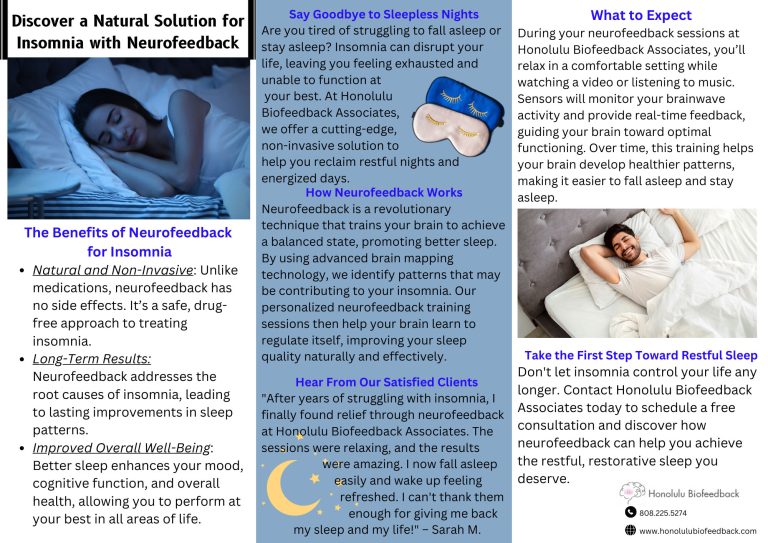Insomnia
Achieving Better Sleep with Neurofeedback
Insomnia is a condition that disrupts the ability to fall asleep or stay asleep, crucial for overall health and optimal mental and physical performance. Chronic sleeplessness can accelerate aging, impair memory, and reduce hormone production. Neurofeedback training offers a solution.
Understanding Insomnia Causes
Chronic insomnia often stems from persistent brain activity that prevents the mind from shutting down, leading to sleep disturbances. Excessive mental activity can keep individuals awake, ruminating over daily stresses or future concerns. Neurofeedback aims to teach the brain to relax, facilitating easier and more sustained sleep.
Importance of Sleep
Sleep plays a pivotal role in maintaining overall health and well-being, influencing both physical and mental functions essential for daily life. Physically, sleep facilitates the body’s repair processes, supporting muscle and tissue restoration, and bolstering immune function to combat illnesses effectively. Cognitively, sleep is crucial for memory consolidation, learning, problem-solving, and decision-making abilities. Emotionally, adequate sleep promotes stable mood regulation, reducing feelings of irritability, stress, and mood swings. Hormonally, sleep helps regulate appetite, metabolism, and hormone production, impacting overall energy levels and physical vitality.
How Neurofeedback Can Help
Neurofeedback offers a promising solution for managing insomnia by targeting the brain’s electrical activity to foster healthier sleep patterns. By training the brain to regulate its activity, neurofeedback promotes relaxation and diminishes hyperactivity that can disrupt sleep initiation and maintenance. This therapeutic approach leverages neuroplasticity—the brain’s ability to reorganize and form new neural connections—enhancing the brain’s capacity to maintain optimal sleep-wake cycles and improve sleep quality over time.
Neurofeedback utilizes brain mapping technology to assess and monitor brain activity patterns. This data guides Dr. Kari Leong in creating a personalized training plan to cultivate new, healthier neural connections that promote better sleep quality that is drug-free and an alternative to traditional sleep medications.
What to Expect
By addressing insomnia effectively, neurofeedback helps individuals experience enhanced cognitive performance, including improved memory, concentration, and mental clarity, fostering greater productivity at work or school. Emotionally, neurofeedback contributes to reduced symptoms of stress, anxiety, and depression, promoting a more positive outlook and emotional resilience. Physically, improved sleep quality leads to increased energy levels, better physical endurance, and quicker recovery from daily activities, ultimately enhancing overall quality of life and supporting long-term health and well-being.
Improvements in sleep quality typically emerge after ten to twenty neurofeedback sessions; for some this happens sooner. This approach can be likened to brain exercise, fostering calmer brain function and enhancing the ability to achieve and maintain restful sleep naturally, without reliance on medication.


